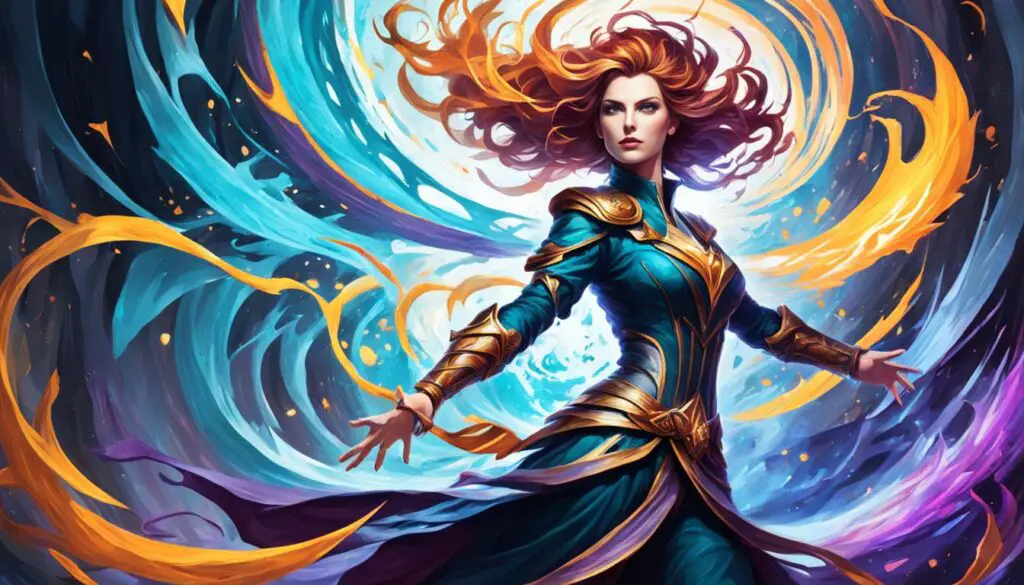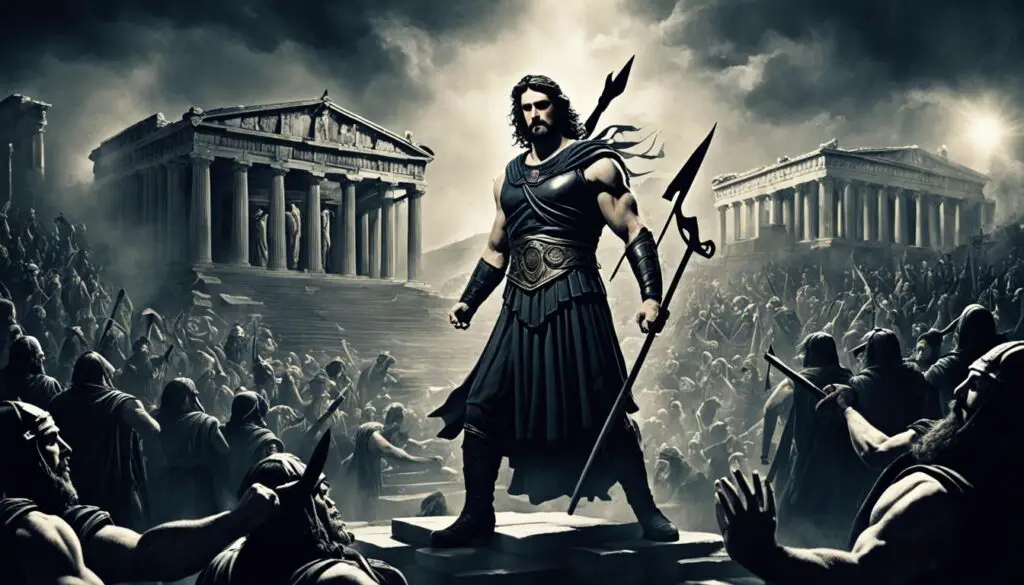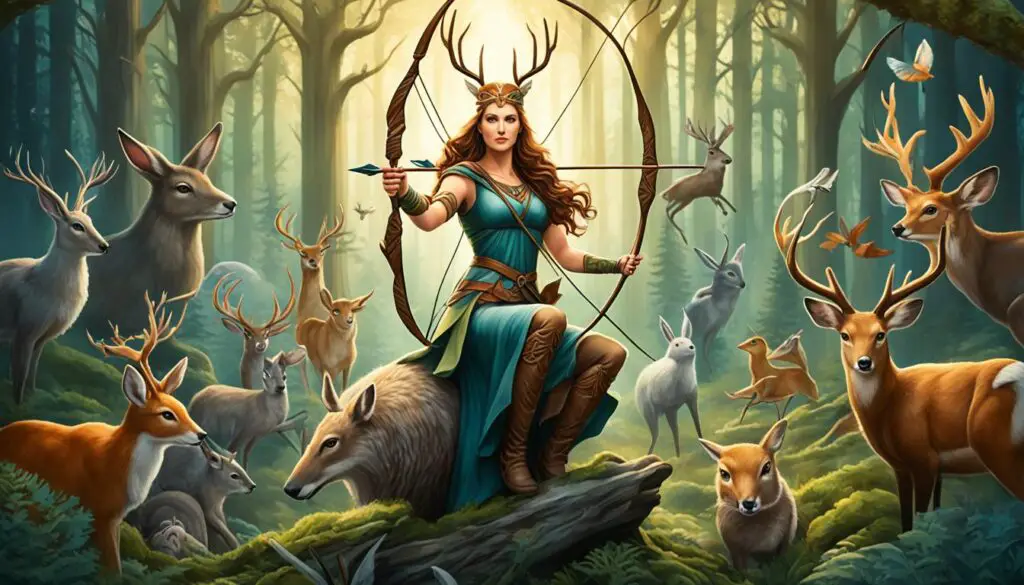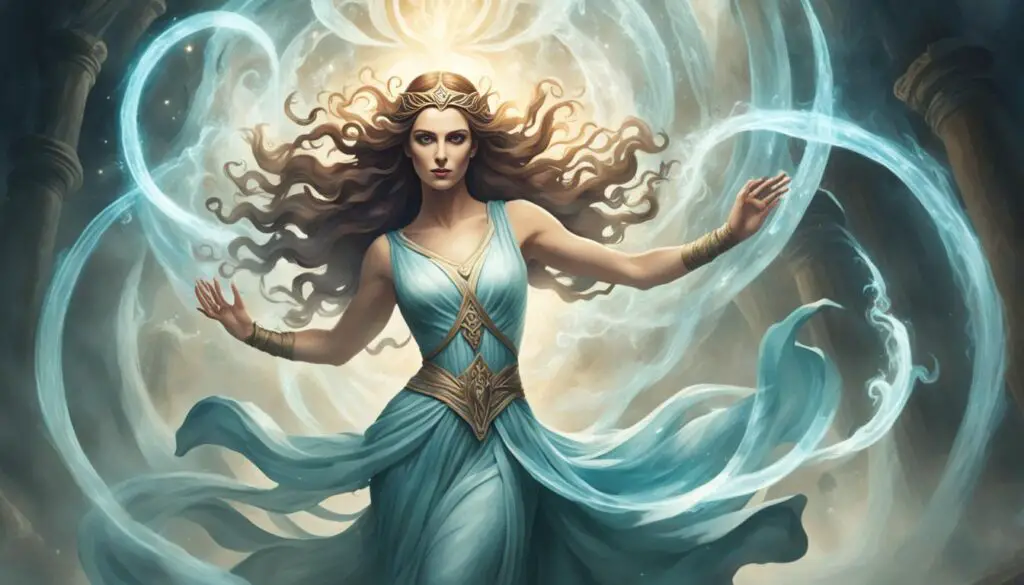Lyssa in Greek mythology is a character that’s not always in the spotlight. She symbolizes the spirit of mad rage, frenzy, and even animal rabies.
This shows an important side of ancient Greek beliefs. They saw Lyssa as the face of uncontrollable emotions, which they thought came from the gods.
Exploring Lyssa mythology lets us understand deeper stories. These tales connect with other mythological characters.
It’s like getting a peek into how ancient people thought and what they valued culturally.
Key Takeaways
- Lyssa in Greek mythology symbolizes mad rage and frenzy.
- She reflects ancient Greek beliefs in the divine origins of psychological states.
- Lyssa’s stories intertwine with other significant mythological figures.
- Understanding Lyssa provides cultural and psychological insights into ancient Greece.
- Her depiction in myths helps explain the ancients’ views on uncontrollable emotions.
Introduction to Iyssa in Greek Mythology
In Greek mythology, Lyssa is known for fury and madness. She plays a big role in many legends.
She brings rage and chaos, standing out among the spirits that represent human feelings and ideas.
Learning about Lyssa’s background helps us understand her role in Greek stories.
Iyssa symbolizes anger and interacts with famous myth figures. Her energy is intense and wild.
This makes her both feared and respected. She shows how powerful feelings of anger can affect gods and humans.
The story of Lyssa has evolved, showing her importance in Greek myths.
Stories often talk about her affecting people and gods, leading to major events. She’s linked to fury in battle, like that of wild animals.
This part of the Lyssa background shows how passion can turn destructive.
In art, Lyssa is shown with other scary spirits. Artworks like vase paintings display her as a chaos-bringing force.
By looking into the complex Lyssa character, we get a better view of her role. This gives us valuable insights into her meaning in Greek mythology.
Origins of Lyssa: From Primordial Spirits to Personifications

Greek mythology is full of unique characters and gods, each standing for different human experiences.
Lyssa emerges from this rich backdrop, with roots in ancient, primordial spirits.
This backdrop sheds light on her significant place among Greek myths.
Parentage and Birth
Lyssa’s tale starts with her being the offspring of primordial beings, linked to the natural elements from Greek stories.
Legends say she is the child of Aether (sky) and Terra (Earth).
This heritage aligns her with other key figures, showing her deep connection to the sky and earth.
Her birth from chaos and creation ties her essence to the beginnings of the world.
Connection to Other Deities
Lyssa is closely tied to other gods, reflecting Greek myths’ interconnected nature.
Her bond with the Maniai, goddesses of madness, highlights her as a symbol of intense anger and madness.
Legends also connect her with Nyx (Night) and Ouranos (Sky). These relationships illustrate Lyssa’s involvement with other deities, marking her as a figure of extreme emotions.
The Role of Lyssa in Athenian Tragedies

Lyssa plays a crucial role in Athenian tragedies. She highlights themes of divine intervention and how fragile humans are.
In Greek mythology, Lyssa is seen as a force of divine anger, bringing madness to people.
Her character in works by famous playwrights like Aeschylus and Euripides is unforgettable.
Appearance in Aeschylus’ Works
Aeschylus is seen as the founder of tragedy. He used Lyssa to show how divine madness can ruin lives.
In his surviving plays, Lyssa’s role is key. In “Prometheus Bound,” she showcases the dire consequences of opposing Zeus, highlighting the deep turmoil characters face.
Role in Euripides’ Herakles
In Euripides’ works, Lyssa plays a big role, especially in “Herakles.” She represents fate and how powerless humans are against gods.
Hera commands Lyssa to drive Herakles mad, leading to a heartbreaking family tragedy.
Through Lyssa’s story, Greek mythology explores serious moral issues in Athenian tragedies.
Euripides often used goddesses in his plays. Lyssa appears in several key pieces.
Out of his eighteen plays that survive, six feature goddesses. This shows how important divine characters are in his stories.
Who Was Lyssa in Greek Mythology: Character and Attributes

Lyssa in Greek mythology stands out for her mix of madness and divine rage.
This legend explores the stormy sides of emotions, showing Lyssa as a tool for gods to use in punishment and change.
Embodiment of Madness and Rage
Lyssa represents a deep blend of madness and rage, common in Greek tales.
She unsettled gods and humans alike. Her madness introduced chaos, while her rage showed her protective and destructive power.
Depictions in Art and Literature
Many artists and writers have been drawn to Lyssa’s story. She is often shown in art with intense expressions, amidst chaos.
Her story continues to impact narratives and character growth in Greek storytelling.
Stories and Legends of Lyssa

The myths of Lyssa are well-known in Greek mythology. She is seen as the goddess of mad rage and frenzy.
Some say she is the daughter of Nyx (Night) and Ouranos (Sky). Others believe she is the child of Gaia (Earth) and Aether (Air).
These stories show her as being dark and turbulent.
Lyssa had a big influence on both humans and gods. One famous story involves Heracles.
He was made to kill his family by Lyssa, under Iris’s orders. But Athena stopped him, showing even Lyssa had to listen to the more powerful gods.
There are many tales about Lyssa causing madness. For example, she made Actaeon’s dogs wild.
She drove the daughters of Minyas and King Cecrops’ daughters mad.
These stories show she only used her powers when she felt it was needed.
Lyssa is also linked to the Maniai, spirits of madness. People were both scared and respectful of her.
They would sacrifice animals to calm her anger. Her festivals had wild dances to invite her spirit.
In art, Iyssa looks fierce with wild hair and intense eyes. Her colors are red and black, showing her powerful wrath and dark side.
Snakes, which symbolize danger, are often seen with her. This shows how people saw the dangers of anger.
Lyssa’s Connection to the Maniae and Other Spirits

Lyssa’s mythology is closely tied to the Maniae, spirits of frenzy and madness.
This link shows the complex relationships among gods representing different human feelings and conditions.
It highlights the depth of intense emotions in our lives.
Relationships with Other Deities
Besides the Maniae, Lyssa connects with deities like Dionysus. Dionysus is the god of wine and wild celebrations.
This shows how these gods represent various forms of passion and madness.
Presence in Roman Mythology as Ira and Furor
Lyssa’s stories go beyond Greek myths, reaching into Roman lore as Ira and Furor.
These names stand for wrath and rage. It highlights her adaptability and the lasting influence across different cultures.
It’s a nod to our universal battle with strong emotions.
Exploring Lyssa’s myths gives us a deeper cultural understanding. It helps us see the big themes in ancient stories and their importance today.
The Significance of Lyssa in Greek Culture

Lyssa holds deep significance in Greek culture. She symbolizes the ancient Greeks’ grasp of psychological struggles and their impacts.
Symbolism and Influence
Lyssa in Greek mythology symbolizes extreme emotional states. As the spirit of mad rage and rabies, she shows the chaos of madness.
Her origins from Erebus and Nyx highlight her connection to the dark sides of life.
Her influence reaches into Roman myths as Furor. This shows her impact across cultures.
Lessons from Iyssa’s Myths
Stories about Lyssa teach us about human behavior and emotion’s power. She plays a role in Herakles’s tragic story, and Hera sends her to drive him mad.
This leads to Herakles causing tragedy, killing his family.
This story teaches us about the danger of uncontrollable anger. It shows us how divine whims and human fragility can mix, leading to disasters.
It’s a lesson in ethics: the balance between our actions and the gods.
Visual Representations of Iyssa

In Greek mythology, visual images of Lyssa show us a lot about divine madness.
These images are found in vase paintings and other artworks. They capture the hard-to-grasp nature and strong emotions of Lyssa.
Vase Paintings and Artworks
Art showing Iyssa brings her wild fury to life. These images often show her with intense facial expressions and dynamic poses.
This symbolizes the frenzy and anger she creates.
The artwork on ancient vases offers insights into Iyssa. It shows how people saw her and her importance in myths.
Iconography and Symbols
Lyssa’s symbols include figures with serpents or holding torches. These show her madness and power to destroy.
Artists used strong contrasts and bold lines to show her unstable nature.
These symbols do more than just show what she looked like.
They also bring out themes of divine anger and wild rage in Greek myths.
Studying these symbols helps us understand the values and stories of ancient Greece.
Iyssa’s Role in the Myth of Actaeon
The story of Actaeon, a young hunter, shows the terrible power of Lyssa from Greek myths.
Lyssa makes Actaeon’s dogs turn against him, leading to his sad end. This tale is crucial in showing how the Greeks viewed divine punishment and human pride.
Actaeon accidentally sees Artemis bathing and she gets mad. She uses Lyssa to drive Actaeon’s dogs mad. Suddenly, his loyal dogs attack him.
Madness comes off as something outside that takes over the mind.
The story of Lyssa and Actaeon warns us about how the divine can change fate. It shows madness as a dangerous and old force.
The myth talks about how outside forces shape how we act. Iyssa’s role here shows how gods could cause chaos.
Turning Actaeon’s dogs against him warns us about crossing gods.
The myth ends with Actaeon’s tragic fate. It shows how gods could play with human lives.
This story is a powerful picture of punishment and human weakness in ancient times.
Influence of Lyssa on Mortal and Immortal Actions

In Greek mythology, Lyssa had a huge impact on everyone, gods and humans alike.
Her nature of causing madness changed many stories. The Lyssa’s impact on heroes like Herakles shows how gods’ actions affected famous tales.
Impact on Heroes like Herakles
Lyssa played a big role in Herakles’ story, as told by Euripides.
She made him lose his mind, leading to him mistakenly killing his family.
This sad moment shows that gods had the power to change what happened to even the strongest heroes.
Infliction of Madness on Mortals
Lyssa didn’t just affect heroes; she also made regular people go crazy.
She used this power to change how people’s lives turned out. Lyssa’s impact shows how humans were at the mercy of gods.
Her stories remind us of life’s uncertainty in the Greek gods’ world.
Modern Interpretations of Iyssa’s Myths
Today, Iyssa’s myths continue to be vital in our culture. She was the fierce Greek goddess of rage.
Now, her story is retold through media and art. These retellings show how her key themes—anger, madness, vengeance—still touch us.
They mirror the emotions and challenges we face in society today.
Cultural Legacy
Lyssa’s impact reaches beyond old stories. Nowadays, you can see her influence in art, literature, theater, and even digital media.
Artists and writers use Lyssa’s symbols to add depth to their works.
Colors like red and black, linked to her story, represent intense emotions and key plot changes.
Her myth inspires many, proving her lasting effect.
Resonance in Contemporary Media
Lyssa shows up in novels, movies, and video games today. Her narrative helps explore deep feelings and conflicts, making her relevant in current stories.
For instance, characters that show the destructive side of anger reflect Iyssa’s essence.
These modern takes on her story helps keep her myth alive for new audiences.
The reinterpretations of Lyssa’s myth show how ancient stories stay meaningful.
To learn more about Iyssa, check out her story here. To see how myths shape across cultures, read this article on Celtic mythology.
These links offer a wider view of Lyssa’s legacy and its ongoing relevance.
FAQ
Who was Iyssa in Greek mythology?
Iyssa was the spirit of mad rage and frenzy in Greek mythology. She represented uncontrollable emotions. Her role in myths showed the Greeks’ ideas about mind states and divine origins.
What is Iyssa’s background in Greek mythology?
Iyssa comes from deep in Greek mythology, connected to ancient gods. She stands for divine anger and madness. Her influence is in many stories and art from ancient Greece.
What are the origins of Iyssa in Greek mythology?
Iyssa comes from ancient spirits, showing her importance in myths. Her story connects with other gods, showing complex myth relationships.
How was Iyssa connected to other deities?
Iyssa was linked to other gods and spirits in Greek myths. These connections showed how cosmic forces interacted, mixing rage with divine acts.
What is Iyssa’s role in Athenian tragedies?
Iyssa was important in Athenian tragedies, like those by Aeschylus and Euripides. She signaled divine anger, teaching moral lessons. Her presence affected mortals’ destinies in these stories.
What are Iyssa’s main character traits?
Iyssa is all about madness and divine anger. She was used for punishment and change in Greek myths. Her traits are shown in art and stories, highlighting her myth impact.
How is Iyssa depicted in ancient art and literature?
Iyssa shows up in art and stories, giving us views of her spirit. These images show her power and wrathful side.
What are some famous stories involving Iyssa?
Stories with Iyssa show her dealing with gods and humans. A famous myth is about Actaeon. Iyssa made his dogs turn against him, showing the danger of her wrath.
What is Iyssa’s relationship with the Maniae and other spirits?
Iyssa is closely linked to other spirits, highlighting Greek mythology’s depth. This shows how divine beings are connected.
How did Iyssa’s myth extend into Roman mythology?
In Roman myths, Iyssa became known as Ira or Furor. This shows her story was adaptable and lasted through cultures.
What is the cultural significance of Iyssa in Greek mythology?
Iyssa’s stories reflect Greek ideas on turmoil and its effects. Her myths give deep insights into ethics and divine-vs-mortal actions.
How is Iyssa visually represented in Greek art?
Greek art, like vase paintings, shows how they saw madness and fury. This art brings Iyssa’s stories to life.
What role does Iyssa play in the myth of Actaeon?
In Actaeon’s myth, Iyssa makes his dogs mad, leading to his death. This story shows Greek views on divine punishment and hubris.
How does Iyssa influence both mortal and immortal actions in Greek mythology?
Iyssa’s effect is seen on heroes and mortals alike. Her deeds highlight gods’ roles in shaping stories and morals.
What are modern interpretations of Iyssa’s myths?
Today, Iyssa’s stories are seen in new ways in culture and media. Modern tales keep her story alive, affecting art and our cultural memory.




